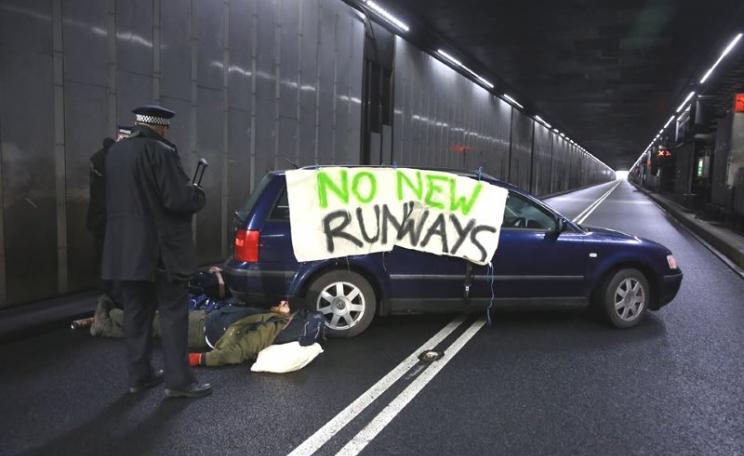Above: the Solar Impulse plane in action (© Solar Impulse/Stéphane Gros) Below: it lands safely in Brussels (© Solar Impulse/Reuters/Pool/Thierry Roge)
On Friday 13th May, a solar-powered plane took off from an airfield in Switzerland and, 13 hours later, landed in Belgium. The flight was part of Solar Impulse, a project run by the Swiss technical institute, Ecole Polytechnique Federale de Lausanne. The plane’s propellers were powered by 12,000 solar cells located on the aircraft’s wings, which despite the lightweight design have a similar span to those of a Boeing 777. The project aims to prove that air travel doesn’t have to contribute to climate change, but at an average speed of 70 km/h, it’s apparent that solar avaiation will need more research and investment before it goes into commercial production.
So was it worth the effort and the £300,000 price tag? Environmentalists have mixed feelings about solar as an alternative energy source for air travel. On one hand, solar is considerably more sustainable than fossil fuels and causes no greenhouse gas emissions. AirportWatch, an umbrella organisation for those concerned about the environmental effects of the aviation industry, reports that the 16,000 aeroplanes operating on a daily basis emit over 750 million tonnes of CO2 annually. Just one return flight between London and New York generates between 1.5 and 2 tonnes of carbon dioxide per person, all of which could be avoided if solar technology was in place. Friends of the Earth aviation campaigner Richard Dyer believes there’s some potential in this area of research. ‘This solar powered plane is an interesting experiment,’ he comments, ‘and we support further research and development in this area.’ But he also has doubts about solar's potential to make a genuine impact on the mainstream commercial aviation industry.
 ‘We need to be realistic – this technology won’t find its way into regular airline services anytime soon,' says Dyer. 'There are no quick fixes for cutting climate changing emissions from aviation so our top priority should be to curb the increase in flights.’ The issue of airport expansion has been hotly debated recently with some calling for the expansion of Heathrow and London City airports, among others. Dyer says these plans will only bring damage to the environment and communities around the airports: ‘The Government must rule out airport expansion in its current review of aviation policy, and focus on improving greener alternatives to flying such as better rail services and business teleconferencing facilities.’ Friends of the Earth also argue that airports don’t just cause air and noise pollution but hurt local economies because they encourage an outflow of people and revenue from regions that really need these resources. Social issues aside, in environmental terms, there’s still plenty to be done.
‘We need to be realistic – this technology won’t find its way into regular airline services anytime soon,' says Dyer. 'There are no quick fixes for cutting climate changing emissions from aviation so our top priority should be to curb the increase in flights.’ The issue of airport expansion has been hotly debated recently with some calling for the expansion of Heathrow and London City airports, among others. Dyer says these plans will only bring damage to the environment and communities around the airports: ‘The Government must rule out airport expansion in its current review of aviation policy, and focus on improving greener alternatives to flying such as better rail services and business teleconferencing facilities.’ Friends of the Earth also argue that airports don’t just cause air and noise pollution but hurt local economies because they encourage an outflow of people and revenue from regions that really need these resources. Social issues aside, in environmental terms, there’s still plenty to be done.
| READ MORE... | |
 |
GREEN LIVING Carbon offsetting version two: a greener way to travel? Carbon offsetting isn't perfect but Much Better Adventures’ partnership with environmental charity, the Converging World, has produced an initiative that just might work |
 |
GREEN LIVING The Really Wild Show: Namibia's pioneering conservancies From the endless red dunes of the south to the teeming game reserves of Damaraland, Namibia is home to some of the world’s most important eco-systems. Ruth Styles went to find out how local people are helping to preserve them |
 |
GREEN LIVING Belfast: the green guide Combining great nightlife and delicious organic food with a fascinating past and friendly locals, Belfast is the perfect place for a British weekend break |
 |
GREEN LIVING The Green Ireland travel app: the Emerald Isle just got greener Want to find a way to enjoy the incredible landscapes of Ireland without leaving your carbon footprints all over them? There’s an app for that! |
 |
GREEN LIVING Wild with heart: 'Voluntouring' at the Taricaya Ecological Reserve in Peru Combining stunning jungle scenery with the chance to get close to wildlife and give something back Taricaya Ecological Reserve offers volunteering opportunities that can make a real difference |








